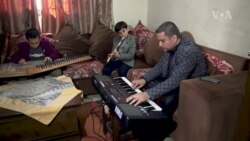With extra time on their hands while under quarantine during the coronavirus pandemic, the al-Ayoubi family in the Palestinian coastal enclave of Gaza Strip is playing incredible pieces of music inspired by Palestinian folklore and classic Arabic compositions.
Thirty-seven-year-old Ahmed al-Ayoubi spends his days teaching his two sons Hamza, 11, and Basheer, 9, to play their favorite musical pieces and post them on such social media platforms as Facebook to put a smile on peoples’ faces. The three play the zither, flute, and electric organ.
“Staying at home for a long time has adversely affected the psychological state of my children,” said al-Ayoubi, a father of four and a musical composer and arranger in Gaza city.
Music provides protection
He said his two sons are musically inclined and have been able to learn complex pieces during the lockdown.
“We are facing a severe disease that does not differentiate between young and old. So, I felt it is my duty to protect my children and prevent them from going out or mixing with anyone outside home,” he told VOA.
Gaza Strip, under control by the Islamist group Hamas, declared a state of emergency on March 22 after recording its first case of COVID-19. Authorities have subsequently shut down all public places such as mosques, universities, schools and sit-down restaurants to contain the virus.
One of the places affected by the lockdown, the Edward Said National Conservatory of Music, is where the al-Ayoubi children were taking their music lessons before the coronavirus spread.
'Like learning a new language'
The older boy, Hamza, has been playing the zither since the age of five. He told VOA he was concerned a prolonged pandemic could impede his progress.
“I am playing the zither to get rid of my negative power and to improve my talent as well," said Hamza. "Playing music is like learning a new language. We may forget it if we don't practice it continuously, especially since we do not know when the outbreak of the disease in the world will end," he added.
During the weeks of quarantine, Hamza has been able to master Palestinian folklore pieces such as Ya Zareef al-Tool, Wein A' Ramallah and Mijana Wa Ataba. He says posting the music online has gained him many fans.
"The lockdown has a highlight,” he said, “because I became famous in Gaza Strip through my music.”
New to the flute
Hamza’s younger brother, 9-year-old Basheer, started playing two years ago and has been equally attracting followers online with his flute. Unlike Hamza, he said he enjoys playing classic Egyptian songs of Om Kalthoum, Abdel-Halim Hafez and Farid al-Atrash.
"Music has helped us to forget the lengthy period we spend at home without seeing our friends and playing with them," he told VOA.
Palestinian territories have reported at least 501 coronavirus cases, including 17 in the Gaza Strip, 159 in East Jerusalem and 325 in the West Bank.
Meanwhile, the World Health Organization has warned that the Gaza Strip could become one of the most severely hit areas by the virus due to its densely populated neighborhoods and an ailing health care system.
Gaza Strip is home to nearly 2 million people and came under the control of U.S.-designated terror group Hamas in 2007 when the militant group took over by force from troops loyal to the Fatah group. Since then, an Israeli blockade and internal Palestinian division have led to a severe humanitarian deterioration particularly in the economic and health sectors.





